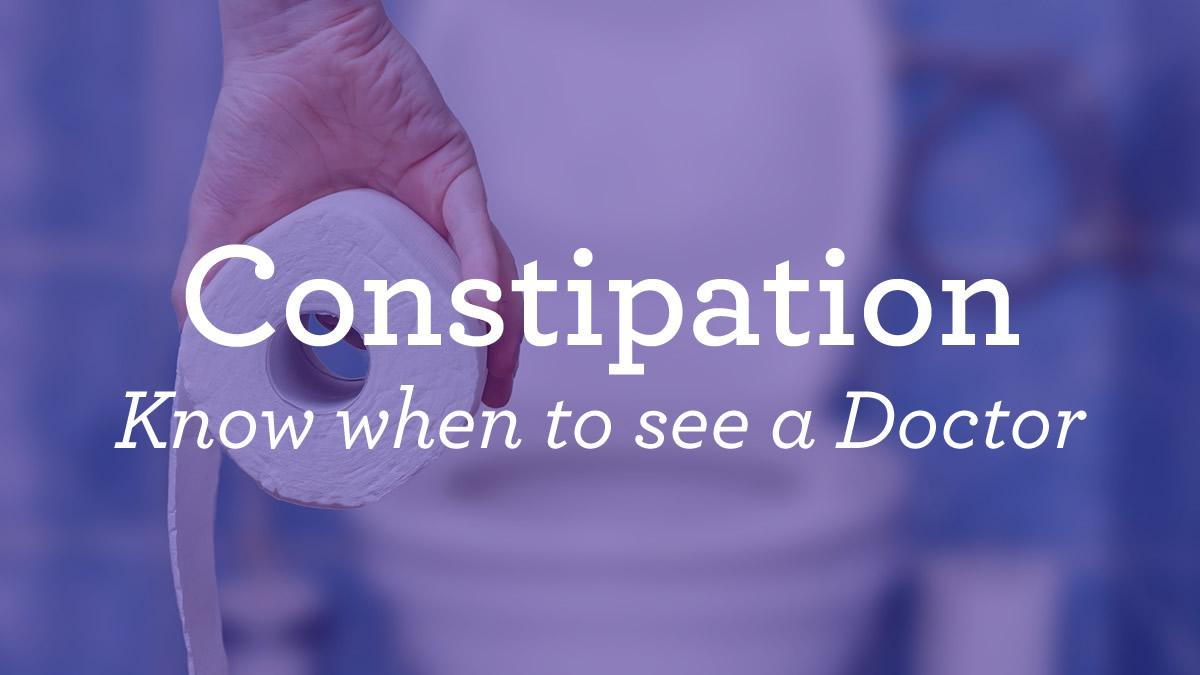Constipation – It's time to see a Doctor | Arshad Malik, MD
posted: Apr. 17, 2019.
Everyone poops. But lately you’ve been having trouble in that area. Long trips to the restroom at work, or the privacy of your own bathroom – but nothing’s happening, and it’s got you worried. You may feel bloated, and when you do poop, your stools are way more solid and painful than you’re used to.
Short-term constipation is normal, and it usually goes away within a few days, usually after you drink plenty of water and take an over-the-counter (OTC) laxative. But long-term, or chronic, constipation can go on for weeks/months – and can often result in hemorrhoids, and injuries to your anus. If you’re struggling with chronic constipation, and wondering what the cause could possibly be – you’re in the right place!
URGENT – Please seek immediate medical attention or visit the ER if you experience constipation with vomiting or severe abdominal pain.

Should I Go to the Doctor If I’m Constipated?
Even if your constipation symptoms are not creating an urgent problem, they can be representative of a larger medical issue, and might need to be evaluated by a doctor. If your constipation has lasted longer than 3 weeks, it would be a good idea to see a physician – primary care, or gastroenterologist.
If you experience any of the following alongside constipation, I recommend seeing a gastroenterologist:
- Dramatic weight loss
- Blood in the toilet bowl or when you wipe
- Constipation after starting a new medication
- A family history of colon cancer or IBD
The Type of Doctor to See for Constipation
Selecting the doctor to see for chronic constipation depends on symptoms and type of care you are looking for. Primary care physicians can be a good initial option for evaluation. However, they have limited gastrointestinal training, so their recommendations will have a more narrow focus and most likely include laxatives to achieve short-term relief.
A second option is to see a digestive specialist called a gastroenterologist. In addition to medical school, a gastroenterologist has 6 years of training with an internal medicine residency and gastroenterology fellowship. This training coupled with work-related experience as a gastroenterologist allows the GI doctor the ability to properly evaluate patients for possible underlying causes of constipation and give a more thorough examination.
Unless your constipation is associated with symptoms like worsening abdominal pain or have a medical history involving bowl blockage either option should be fine. It comes down to the level of analysis you are looking for.
GI Doctor Constipation Evaluation Methods
A gastroenterologist may use one or more of these tests to understand your constipation better:
- Blood test – by checking your blood, thyroid stimulating hormone (TSH), calcium, blood glucose level, and electrolytes.
- Colonoscopy – a physical exam that uses a camera on the end of a flexible tube to look for blockages or anything suspicious.
- CT scan of abdomen – A detailed scan of your abdomen, including your gut, liver, and kidneys.
- Hypaque enema – Another way of examining your gut, this is an x-ray image of the lower intestine.
- Sitz marker study – a simple way to evaluate the speed at which food moves through your gut.
Preparing to Talk to Your Doctor
You may find it helpful to come up with a list of questions before your appointment with the gastroenterologist, as it allows him or her to be better equipped to help manage your concerns.
Also come prepared with the following information:
- A list of medication you’re taking
- A food diary, or rough idea of what you typically eat
- Details on any other conditions you’re currently dealing with
- Allergies
- Any current life events you’re experiencing (expecting a child, stress at work, bereavement)
An initial appointment does not involve any intrusive tests or treatments, so there is no immediate need to attempt to empty your bowel, and it’s safe to eat beforehand.
Constipation Treatment Options
Mild cases of constipation can be treated at home in the following ways:
- Switching processed foods for high fiber foods such as fruit, vegetables, and beans.
- Drinking more water, and ditching the soda and coffee.
- Move around – exercise can get your gut moving!
- Don’t avoid going to the toilet – go when you need to go, and don’t try to rush or strain once you’re there.
- Dealing with your stress and making more time to relax.
If these changes don’t do the trick, try adding a gentle laxative like milk of magnesia or MiraLax. In cases where home remedies or OTC laxatives are not able to alleviate constipation, your physician will have other options they can prescribe.
Constipation Causes
Chronic constipation can be caused by a number of factors – often two or more working together.
These include:
- Lifestyle – low water intake, poor diet, or sedentary habits.
- Medication use – many over-the-counter and prescribed medications can contribute to constipation. Be aware of any known side effects. (Please remember that you should always speak to a doctor before stopping a medication.)
- Health issues – depression, pregnancy, diabetes, thyroid issues, and any condition that restricts movement.
- Gastrointestinal issues – bowel obstruction or stricture, changes in the rectum, or cancer.
Symptoms of Colon Cancer
Colon cancer is the third most common cancer in the United States (excluding skin cancers and gender specific cancer).
Symptoms of colon cancer include:
- Constipation, or a change in bowel movements
- Severe tiredness
- A drop in weight
- Anal bleeding or blood in your poop
- A lump or pain in your stomach
If you are experiencing one or more of these symptoms, it’s time to get checked out – colon cancer is easier to beat the earlier you catch it, and constipation can be an indicator of this cancer. So don’t suffer in silence.
If you're concerned about your chronic constipation, or would like to discuss how your digestive health is affecting your daily life with a gastroenterologist in the Dallas/Plano TX area, please fill out our appointment form or call us at 972-867-0019.
We are happy to answer any questions and help to get you feeling better!




